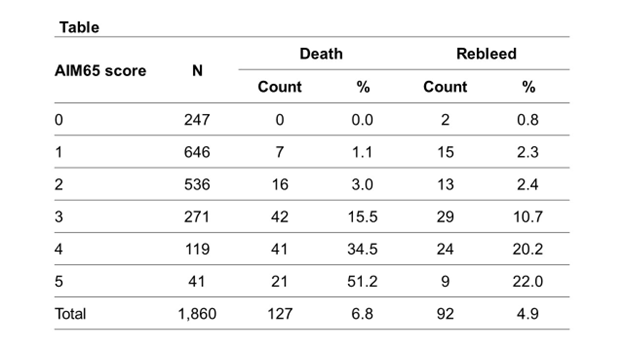Oral Paper Presentation
Annual Scientific Meeting
Session: Plenary Session 4A - Liver
63 - AIM65 as an Indicator of Rebleed and Mortality Risk in Patients Using Factor Xa Inhibitors Hospitalized for a Gastrointestinal (GI) Bleed (Late-Breaking Abstract)
Wednesday, October 30, 2024
9:50 AM - 10:00 AM ET
Location: Terrace Ballroom 1

Brooks D. Cash, MD, FACG (he/him/his)
Professor of Medicine; Director of the Functional Bowel Center
Baylor University Medical Center/ Baylor Scott and White Dallas
Dallas, TX
Late Breaking Abstract Presenter(s)
Brooks D. Cash, MD, FACG,1 Christopher W. Baugh,2 Craig I. Coleman,3,4 Raymond C. Chang,5 James M. Williams,5 Mark D. Danese,6 Adam J. Singer7; 1University of Texas Health Science Center at Houston, Houston, TX; 2Brigham and Women's Hospital, Boston, MA; 3University of Connecticut School of Pharmacy, Storrs, CT; 4Evidence-based Practice Center, Hartford Hospital, Hartford, CT; 5 US Medical, Biopharmaceuticals, AstraZeneca, Wilmington, DE; 6Outcomes Insights, Calabasas, CA; 7Renaissance School of Medicine at Stony Brook University, Stony Brook, NY
Introduction: The AIM65 score has not been well-studied for predicting mortality or rebleeding in patients with upper, lower, or unspecified GI bleeds receiving anticoagulation (AC) reversal. This is the first study to characterize the likelihood of mortality or rebleeding using the AIM65 score in patients receiving factor Xa inhibitor reversal.
Methods: We conducted a retrospective study of US adults hospitalized for factor Xa inhibitor-associated GI bleeding treated with andexanet alfa (AA) or 4-factor prothrombin complex concentrate (4F-PCC) AC reversal. 1,860 medical records from 409 hospitals were extracted. Patients must have received apixaban or rivaroxaban before admission for GI bleeding. The AIM65 score was calculated during hospitalization after AC reversal and correlated with the risk of rebleeding and death. Discrimination was evaluated using the c-index and the relative risk for AIM65 score >3 using odds ratios (OR).
Results: Median age was 67.0 years (interquartile range [IQR] 56.0-76.0), 63% of patients were male, and 71.8% were taking apixaban. AA reversal was used in 46% of patients and 4F-PCC in 54%. Impaired mental status was present in 50.8% of patients. The mean AIM65 score was 1.8 (0-5 scale) with a median of 2.0 (IQR 1.0-2.0). The most common comorbidities were atrial fibrillation (50.3%), hypertension (43.7%), and diabetes (39.5%). Previous history of GI bleeding was present in 19.3% of patients and history of GI cancer in 9.4%. 44% of patients had upper GI bleeding, 37.8% had lower GI bleeding, 15.4% were not specified, and 2.6% had multiple GI bleeding sources. Vasopressors were used in 12.3% of patients before AC reversal. Stratification by AIM65 showed that the risk of death or rebleeding increased with the AIM65 score (Table). The c-index was 0.87 (95% confidence interval [CI] 0.84-0.90) for death and 0.76 (95% CI 0.71-0.81) for rebleeding. In patients with an AIM65 score >3 versus <3, 24.1% versus 1.6% died and 14.4% versus 2.1% rebled, corresponding to OR of 19.4 (95% CI 12.4-31.7) and 7.8 (95% CI 5.0-12.4), respectively. In sensitivity analyses, the results were similar when the INR >1.5 factor was applied to all patients.
Conclusion: In patients undergoing factor Xa inhibitor reversal for GI bleeding, the AIM65 score was useful for identifying patients with a high likelihood of mortality and rebleeding, particularly for scores >3.

Disclosures: Brooks Cash served as a speaker and consultant for AstraZeneca, Salix Pharmaceuticals, Phathom Pharmaceuticals, QOL Medical, and AbbVie; and served as a speaker for Alnylam, Regeneron, and Sanofi Pharmaceuticals; Christopher Baugh served as a speaker for Roche; participated in advisory boards for Roche, Salix Pharmaceuticals, Pfizer Inc., and AstraZeneca; served as a consultant for Abbott Laboratories, Roche, and Pfizer Inc.; and served as an advisor to Lucia Health Guidelines; Craig Coleman served as a consultant for AstraZeneca and Bayer AG; Raymond Chang is an employee of AstraZeneca; James Williams is an employee of AstraZeneca; Mark Danese is an employee-owner of Outcomes Insights, which received funding for conducting the research; Adam Singer served on a speakers bureau and as an advisor for AstraZeneca.
Brooks D. Cash, MD, FACG, Christopher W. Baugh, Craig I. Coleman, Raymond C. Chang, James M. Williams, Mark D. Danese, Adam J. Singer, 63, AIM65 as an Indicator of Rebleed and Mortality Risk in Patients Using Factor Xa Inhibitors Hospitalized for a Gastrointestinal (GI) Bleed (late-breaking abstract), ACG 2024 Annual Scientific Meeting Abstracts. Philadelphia, PA: American College of Gastroenterology.
Introduction: The AIM65 score has not been well-studied for predicting mortality or rebleeding in patients with upper, lower, or unspecified GI bleeds receiving anticoagulation (AC) reversal. This is the first study to characterize the likelihood of mortality or rebleeding using the AIM65 score in patients receiving factor Xa inhibitor reversal.
Methods: We conducted a retrospective study of US adults hospitalized for factor Xa inhibitor-associated GI bleeding treated with andexanet alfa (AA) or 4-factor prothrombin complex concentrate (4F-PCC) AC reversal. 1,860 medical records from 409 hospitals were extracted. Patients must have received apixaban or rivaroxaban before admission for GI bleeding. The AIM65 score was calculated during hospitalization after AC reversal and correlated with the risk of rebleeding and death. Discrimination was evaluated using the c-index and the relative risk for AIM65 score >3 using odds ratios (OR).
Results: Median age was 67.0 years (interquartile range [IQR] 56.0-76.0), 63% of patients were male, and 71.8% were taking apixaban. AA reversal was used in 46% of patients and 4F-PCC in 54%. Impaired mental status was present in 50.8% of patients. The mean AIM65 score was 1.8 (0-5 scale) with a median of 2.0 (IQR 1.0-2.0). The most common comorbidities were atrial fibrillation (50.3%), hypertension (43.7%), and diabetes (39.5%). Previous history of GI bleeding was present in 19.3% of patients and history of GI cancer in 9.4%. 44% of patients had upper GI bleeding, 37.8% had lower GI bleeding, 15.4% were not specified, and 2.6% had multiple GI bleeding sources. Vasopressors were used in 12.3% of patients before AC reversal. Stratification by AIM65 showed that the risk of death or rebleeding increased with the AIM65 score (Table). The c-index was 0.87 (95% confidence interval [CI] 0.84-0.90) for death and 0.76 (95% CI 0.71-0.81) for rebleeding. In patients with an AIM65 score >3 versus <3, 24.1% versus 1.6% died and 14.4% versus 2.1% rebled, corresponding to OR of 19.4 (95% CI 12.4-31.7) and 7.8 (95% CI 5.0-12.4), respectively. In sensitivity analyses, the results were similar when the INR >1.5 factor was applied to all patients.
Conclusion: In patients undergoing factor Xa inhibitor reversal for GI bleeding, the AIM65 score was useful for identifying patients with a high likelihood of mortality and rebleeding, particularly for scores >3.

Disclosures: Brooks Cash served as a speaker and consultant for AstraZeneca, Salix Pharmaceuticals, Phathom Pharmaceuticals, QOL Medical, and AbbVie; and served as a speaker for Alnylam, Regeneron, and Sanofi Pharmaceuticals; Christopher Baugh served as a speaker for Roche; participated in advisory boards for Roche, Salix Pharmaceuticals, Pfizer Inc., and AstraZeneca; served as a consultant for Abbott Laboratories, Roche, and Pfizer Inc.; and served as an advisor to Lucia Health Guidelines; Craig Coleman served as a consultant for AstraZeneca and Bayer AG; Raymond Chang is an employee of AstraZeneca; James Williams is an employee of AstraZeneca; Mark Danese is an employee-owner of Outcomes Insights, which received funding for conducting the research; Adam Singer served on a speakers bureau and as an advisor for AstraZeneca.
Brooks D. Cash, MD, FACG, Christopher W. Baugh, Craig I. Coleman, Raymond C. Chang, James M. Williams, Mark D. Danese, Adam J. Singer, 63, AIM65 as an Indicator of Rebleed and Mortality Risk in Patients Using Factor Xa Inhibitors Hospitalized for a Gastrointestinal (GI) Bleed (late-breaking abstract), ACG 2024 Annual Scientific Meeting Abstracts. Philadelphia, PA: American College of Gastroenterology.

